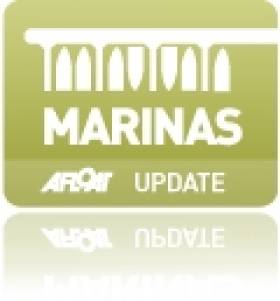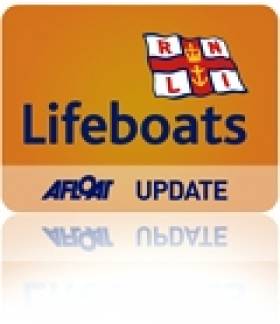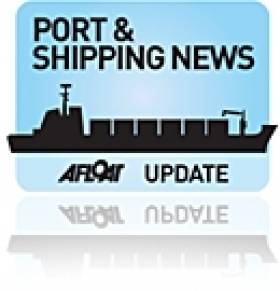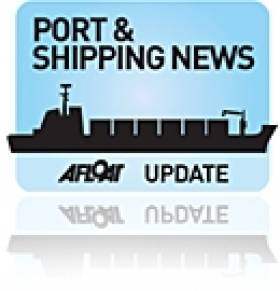Displaying items by tag: Copeland Islands
The Copeland Islands lie on the North Down coast just a short distance off Donaghadee but separated from the town by a fast strong tidal sound which provides interesting but necessarily accurate navigation. So to have the Royal Ulster Yacht Club coastal race round these islands which also have significant overfalls to the east, made an attractive race hosted by Royal Ulster Yacht Club from its start line in Bangor.
 Mew Island Lighthouse Photo: Mark Mackey
Mew Island Lighthouse Photo: Mark Mackey
Top of the IRC fleet was Shaun Douglas from Cockle Island Boat Club just east of Bangor on Belfast Lough in the Beneteau 40.7 Gamechanger ahead of Stuart Cranston’s Ker32 visiting from Strangford Lough Yacht Club. This is the start of a busy season for Gamechanger as they head to the Isle of Man for the Round the Island race starting at Port St Mary on 3rd June; then comes Bangor Town Regatta on 24th June followed by the race to Strangford Lough on 2nd July, then Cork Week in mid-July followed by West Highland Week at the end of that month. Certainly, the Irish Sea will be well travelled. In third slot was the Sigma 33 Squawk owned by Paul and Emma Prentice.
 Shaun Douglas's Beneteau 40.7 Gamechanger from Cockle Island Boat Club on Belfast Lough
Shaun Douglas's Beneteau 40.7 Gamechanger from Cockle Island Boat Club on Belfast Lough
Winner in the four strong Whitesail division was the Bell, Lawther and Bell trio from the host club and Ballyholme in the Oceanis 37 Merry Jack with the Byres/Russell duo in the Sigma 33 Signet from the same clubs.
 Stuart Cranston's Hijacker from Strangford Lough YC
Stuart Cranston's Hijacker from Strangford Lough YC
As it turned out for the thirteen strong fleet made up of IRC and Whitesail, the tides were slack so weren’t a problem on the course which started in a lively 15 to 20 knot south westerly on a run from the RUYC line, taking them east leaving the Islands to starboard. The leg along the east side of the Copelands past the Mew Island Lighthouse where the Ram Harry race was in quiet form, involved only two tacks and then it was back west up the Sound where the tide was slack on a closehaul to Bangor Bay and the finish.
Copelands Marina. Yacht & Boat Berthage at Donaghdee, Co. Down
Copeland Marina is one of Ireland's first marinas. Located on the northeast coast of Ireland two miles south of Copeland Island, that lies outside the entrance to Belfast Lough, and is immediately south of Donaghadee Harbour. It is a compact marina mostly occupied by local boats. It is an ideal destination to enjoy Donaghadee and the Ard's Peninsula with the vessel completely protected in the marina from all conditions.
Manager: Gerald Nicholas.
Copelands Marina Phone: +44 2891 992184 Mobile: +44 7802 36 3382
VHF: Ch 16 ,11, 80
Email - [email protected]
Donaghdee RNLI Comes To Aid of Drifting Fishing Boat
#RNLI - Donaghadee RNLI has assisted two people whose boat got into difficulty off Co Down.
The station’s volunteer lifeboat crew was out on a training exercise on Sunday morning when they were requested to go to the aid of a 30-ft fishing vessel off the Copeland Islands.
Two people were on board the vessel which was drifting off South Briggs. Within minutes the lifeboat was on the scene and found the vessel had a rope around its propeller.
The lifeboat crew was able to establish a tow rope across to the vessel and towed it safely into Groomsport Harbour.
Ship-to-Ship Transfer of OIl Cargo Delayed Yet Again
#SHIPPING - The transfer of hazardous cargo from the stricken tanker at the entrance to Belfast Lough has been delayed yet again due to winds nearing hurricane strength.
The Belfast Telegraph reports that the Genmar Conpanion - which was redirected to Belfast after reporting a cracked hull en route from Rotterdam to New York - will remain sheltering off the Copeland Islands until the weather improves.
As previously reported on Afloat.ie, the ship-to-ship transfer of 54,000 tonnes of vacuum gas oil was originally scheduled to take place on 31 December last, but the task was pushed back as the receiving ship, BW Seine, was delayed by weather in the North Sea.
It had then been hoped to begin the transfer early yesterday with the receiving ship's arrival, but the strong storm-force winds that have increasingly battered Ireland in the last 36 hours put paid to those plans.
Ship-to-ship transfers can take place in wind speeds of up to 35 knots, but yesterday the wind speed in Belfast Lough was reported as more than double that.
Hugh Shaw, the NI Secretary of State's representative for maritime salvage and intervention, told the Belfast Telegraph: "As soon as we have a window to do the ship-to-ship transfer safely we will take it.
"Winds have been dropping a bit, but it looks unlikely the operation will take place on Wednesday."
Transfer of Cargo from Stricken Tanker Delayed
#SHIPPING - The transfer of cargo from the damaged oil tanker sheltering at the entrance to Belfast Lough has been posponed for at least two more days.
As previously reported on Afloat.ie, the 228-metre Germar Companion - which is carrying 54,000 tonnes of vacuum gas oil - was redirected to Belfast after reporting a cracked hull en route from Rotterdam to New York.
The merchant vessel has been sheltering off the Copeland Islands since 16 December, where an official examination recommended removal of the cargo.
Today (31 December 2011) had been the scheduled start date for the move of the tanker's hazardous cargo by ship-to-ship tranfer. But the move has been delayed as the second ship, the BW Seine, is still en route to Belfast Lough.
"It is currently in the North Sea and could take another two days before it reaches the vessel and starts to transfer the cargo," a coastguard spokesperson told the Belfast Telegraph.
The transfer will be managed by specialist company Fendercare Marine in the lough, and could take between 24 and 36 hours. Once finished, the Germar Companion will sail into Belfast for repairs.




























































